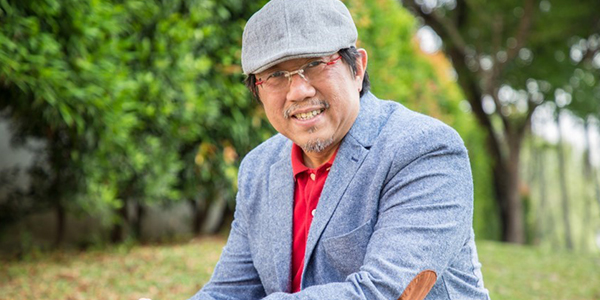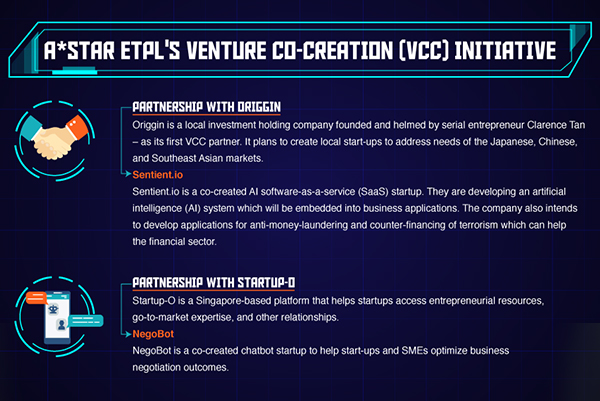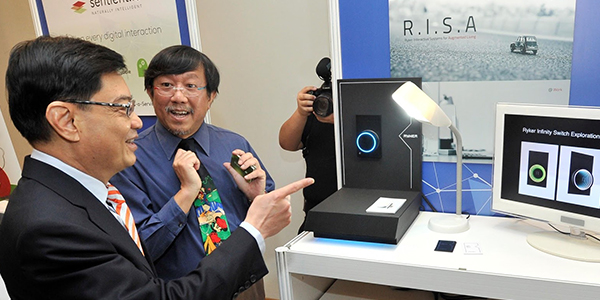INNOVATE
From math-hater to programmer and veteran technopreneur
Published on 2 Oct 2017 – 8:00 | By Pearl Lee | Source: Tech in Asia

Photo credit: Christopher Yeo.
“I’m a greenie-” says Christopher Yeo- founder and CEO of AI startup Sentient.io. He turns to a plant next to him- holds a leaf- and shakes it like a hand. Everyone in the room chuckles.
“I was only interested in canoeing then. I really had fun outdoors-” says the serial technopreneur and investor who runs his own venture fund. “I mucked around a lot and didn’t quite like math. I got through A-levels by the skin of my teeth.”
To most- the dislike for math would last a lifetime. For the programmer- change came in a surprising form in university — religion.
“I said- OK- God- you need to help me like math because I hate math!” He laughs.
After praying- he experienced a “180-degrees change.” In fact- he became really good at the once-dreaded subject.
“There was no turning back. The second year of university onwards- I had no subjects apart from math and computer science-” he says.
Yeo decided to do a double major and got first class honors in both. He started his own software venture just four years out of school- and then became the CTO of Comex Frontier- which was acquired in 2005.
He joined ETPL – the commercialization arm of Singaporean science and tech research agency A*STAR – in 2006. After a year- Yeo left for the National University of Singapore’s NUS Enterprise to learn how to encourage students to create startups.
Ten years on- the veteran entrepreneur is giving back. He is mentoring and creating startups for the venture co-creation (VCC) initiative together with ETPL.

Image credit: Pixabay
A chance encounter in Starbucks
The idea for A*STAR ETPL’s venture builder wasn’t formed in a corporate meeting room. Yeo says it was created in Starbucks at Fusionopolis- home of A*STAR and a major research and development complex in in Singapore’s One-North tech district.
“I was just daydreaming while waiting for a meeting-” Yeo says. By chance- he bumped into his ex-colleague- Tng Tai Hou- vice president of technology development from A*STAR ETPL.
“We haven’t met for a while- but we ended up talking for one and a half hours and forgetting our meetings.”
Tng (together with another partner- Lee Han Boon) belonged to the digital technologies commercialization division in A*STAR ETPL. Together with Yeo- the trio is now back together as a team to run the VCC framework.
While startups are usually created before entrepreneurs seek investors or a CTO- the VCC framework matches promising pre-seed technologies with entrepreneurs and investors even before new startups are created.
Most venture capitalists and angel investors are reluctant to invest in pre-seed companies as they’re riskier. But Yeo plans to turn the entrepreneurial process on its head.
“One way to get things cooking is to figure out what technology the industry needs- raise the funds for that- and then find the entrepreneurs-” Yeo says.
Being veterans in the field- they knew Singapore’s technologies like the back of their hands. But taking them “from mind to market” was a problem.
Yeo thinks the VCC model is more proactive compared to the conventional method- as it “match-makes” entrepreneurial teams with partners and investors- and also helps these startups get a foot into regional markets.
While venture capitalists usually just cherry-pick- VCCs go out- do market research- and identify gaps in the market- go-to markets- and investors. They even round up the potential startup founders.
“Venture capitalists scour around and find what they can get deals for. We’re creating the deal itself-” Yeo says.
Eventually- Yeo aims to link startup founders to overseas markets- investors- and clients through the VCC framework.
“We were first specifically thinking of how to create a company in the AI space-” Yeo says.
Sentient.io- an AI-as-a-Service platform that businesses can leverage on for their own applications- is one of the first co-creations of ETPL and Origgin – a local investment holding company focused on Southeast Asia.
One of the by-products of Sentient.io is a naturally intelligent digital assistant which engages customers through various types of end-user interfaces and channels.

A*STAR ETPL plans to create 7 to 10 startups within three years with each VCC partner. Image credit: Tech In Asia.
Once an entrepreneur- always an entrepreneur
Yeo’s two years in ETPL and NUS Enterprise were formative to his current efforts. “I know many researchers by name now. These are my go-to people-” he says.
Exactly ten years later- the VCC framework was born. Yeo plans to tap on researchers to help nurture technologies and bring them to practical fruition.
One of the startups Yeo is mentoring now is in agriculture – an area he has been passionate about since his school days. Archisen combines urban farming systems with internet-of-things technology and data analytics.
Sven Yeo- co-founder of Archisen- says they want to adopt technology from A*STAR ETPL into their platform. The VCC framework would allow the startup to expand their technical capabilities rapidly.
With so many areas of tech to be developed and contextualized for agriculture- it’s difficult for the startup to spread their resources. For instance- Archisen is looking into autonomous machines that can identify anomalies or diseases through photos. These anomalies would otherwise be difficult to detect with the naked eye.
With A*STAR as a partner- Sven Yeo says they can assimilate helpful tech and reap benefits quickly. “We can go to market faster than if we were to organically raise funds and develop the intellectual property ourselves-” he says.
Yeo shows Singapore’s Minister of Finance Heng Swee Keat how Sentient.io system can be integrated with business applications- for instance the smart system co-created by Singapore-based home appliances manufacturer Ryker. Photo credit: A*STAR.
Christopher Yeo eventually hopes to “create a more informal community of startups that can work together- get projects together- and cross-license technology together.”
They’re looking long-term- where startups last for ten to fifteen years- get traction- and establish a global reach.
“If startups don’t manage the exit properly- they become zombies. Ai si bui si- ai wa bui wa (a Hokkien proverb which means one can neither die nor live)!” Yeo says.
Was the article helpful?
A*STAR celebrates International Women's Day

From groundbreaking discoveries to cutting-edge research, our researchers are empowering the next generation of female science, technology, engineering and mathematics (STEM) leaders.
Get inspired by our #WomeninSTEM

